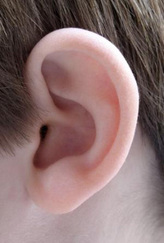 Brittany, the world's newest Jew, standing outside of Mayyim Hayyim, the mikveh where she formally converted to Judaism.
Brittany, the world's newest Jew, standing outside of Mayyim Hayyim, the mikveh where she formally converted to Judaism. I spent yesterday morning with Brittany, her fiancé, and members of his family at Mayyim Hayyim, the amazing mikveh in Newton, Massachusetts. Brittany met with me and two other rabbis in a conversation that lasted a bit less than an hour, and then prepared to enter the waters of the mikveh – a Jewish ritual bath. Once in the water, she made the blessings of immersion. In emerging from the mikveh, she completed a process she began a few years ago. She is now a Jew, as fully and deeply as anyone born Jewish.
The process is a bit more complicated than what I have described in a few sentences, but it is not too mysterious. I often am surprised by the misunderstandings and misapprehensions that many people have about conversion to Judaism. I want to take some of the mystery out of the process and clarify what is required to become a Jew.
Here are some of the questions I commonly hear about conversion:
• "Do you really have to get naked in front of a bunch of rabbis?" This is, by far, the most common question. The simple and honest answer is "No." The final ritual of conversion is immersing in a mikveh. It is a very private experience that should be offered with great consideration for the modesty of the person who is immersing. The immersion must be done in a way that allows the person to enter the water with no barrier between the water and his or her body. So, yes, the person immersing does have to be naked. However, the "bunch of rabbis," do not watch the immersion. Typically, the beit din (the "rabbinic court" of at least three rabbis), stands outside the door of the mikveh room to hear the conversion candidate pronounce the blessings. Also, typically, there is a guide of the same gender as the person immersing who acts as a witness to make sure that the person's entire body (including hair) is immersed under the water. At places like Mayyim Hayyim, the guides are well trained to hold a sheet above their eyes, only lowering it at the moment of immersion to confirm that the immersion is "kosher."
• "I've heard that the rabbi is supposed to turn people away three times before accepting them as conversion students. Is that true?" Much of the basis for conversion established by the ancient rabbis is taken from the book of Ruth. In that biblical story, the non-Jewish Ruth wished to travel with her Jewish mother-in-law Naomi to the Land of Israel and join herself to the Jewish people. Three times in the story, Naomi told Ruth to go back to her own people. Three times, Ruth refused. She finally declared, "Your people shall be my people. Your God shall be my God" (Ruth 1:16). From this biblical precedent, the rabbis developed the ancient practice of discouraging would-be converts three times before accepting them as students. That practice is seldom observed literally today. Instead, candidates for conversion are asked to challenge themselves repeatedly about their beliefs, their identity and their reasons for converting throughout the conversion process.
• "I thought Jews didn't practice proselytism. Is that true?" Judaism was, perhaps, the first religion to accept converts, beginning more than 2,000 years ago. In fact, the English word "proselyte" comes from an ancient Greek word meaning, "a person who converts to Judaism." During the centuries in which Jews were persecuted, rabbis discouraged the practice of seeking and accepting proselytes because it could be fatal. The Romans in the second century C.E. established the death penalty for converts to Judaism and for the rabbis who converted them. In the modern era, there is less reason to shun conversion. The Reform Movement in the 1970s established outreach programs to attract "unchurched" people who were interested in conversion to Judaism, especially the non-Jewish spouses of Jews. The policy of outreach has been accepted by most non-orthodox branches of Judaism today.
• "How long does it take to convert?" Most rabbis ask candidates to spend a year in preparation for conversion, and there are several good reasons for this. The first is that, over the course of that year, the candidate will have a chance to experience a full cycle of Jewish holidays and other observances, to reflect on their meanings and to consider how they will experience them as a Jew. The second reason is more subtle. Converting to Judaism is not just an external process, like putting on a new suit. It requires some internal, emotional processing and integration of a new identity. I'm always delighted to hear the shift in language of a candidate as, "What does Judaism say about…?" slowly transforms into, "How do we do…?" It takes time for that change in perspective to happen. I often tell candidates that they will know when they are ready to formally convert – it will happen when they feel that they already are Jewish on the inside.
• "What do you have to do to convert?" This varies from one rabbi to another. Most rabbis ask conversion candidates to take some kind of "Introduction to Judaism" course. These usually meet weekly over some number of months. In urban areas, they may be offered by a large synagogue, a group of congregations, or by a Jewish Community Center. In more rural areas, it may be harder to find a course and rabbis may be more lax in requiring it. It is also typical for rabbis to ask candidates to meet with them regularly, often once a month, to talk about the conversion process, to answer questions, and to offer spiritual guidance. If the candidate is married or engaged to a Jew, the partner is usually invited or encouraged to attend the classes and the meetings with the rabbi.
• "Is there a test?" No test. Converting to Judaism is not an academic course. There is no grade. There are no right and wrong answers. I encourage conversion candidates to spend time learning about the things that interest them, challenge them, and inspire them about Judaism. One year is not enough time to learn everything that a person might learn about our tradition – a lifetime is not enough. Once candidates are ready to proceed with the final rituals of conversion, I ask them to write a "spiritual autobiography" – usually one to three pages – that tells their personal story of becoming Jewish. This narrative becomes the initial focus of the conversation with the beit din. Typically, candidates meet with the beit din for 30 to 50 minutes to talk about their conversion process, about their developing relationship to Torah, to God and to the Jewish people. After the meeting with the beit din, most candidates are ready to proceed with mikveh.
• "Are most conversion candidates people who are marrying a Jew?" Surprisingly, in my experience, the answer is "No." Most of the conversion candidates I have worked with have been people with no family connection to Jews at all. They are drawn to Judaism as a personal choice. About a third of the candidates I work with are married or engaged to Jews and want to convert in order to create a common religion for their family, to raise their children as Jews, and for their own personal spiritual and religious commitment. Jewish tradition explicitly states that these are all legitimate and acceptable reasons to convert.
• "Do you have to be certain about conversion before beginning the process?" Not at all. Conversion is not right for everyone. Part of the conversion process is discovering if it is the right choice for you. I've had several students who decided not to go through withconversion. In each case, I considered that outcome a "success" for the student.
• "Does converting to Judaism mean that you can't have a Christmas tree?" You'd be surprised how often I hear this specific question! It speaks to the very powerful memories that many people have of Christmas from childhood. Even people who grew up in families that were not particularly Christian or "religious" sometimes feel a sense of loss when they think of Christmas without a tree. So, here is the scoop: Converts to Judaism accept Judaism as their only religion. Converting to Judaism means that a person no longer accepts any other gods or "redeemer," including Jesus. There are plenty of people who have Christmas trees purely out of a sense of family tradition, not out of religious conviction, but this does not change the fact that the Christmas tree is a Christian symbol and practice related to the birth of Jesus. Why would a Jew who is a member of an exclusively Jewish family want to continue that practice? That being said, there is nothing wrong with Jews who visit the homes of non-Jewish parents and other relatives to be with them for their holiday. There also are Jews whose immediate families include Christians, and it is not inappropriate for their homes to include Christmas customs for the sake of the non-Jewish family members. Getting over the "Christmas Tree Question" can be hard for some converts, but it is by no means the most difficult part of accepting a Jewish identity.
• "What about circumcision?" Men have an additional requirement to convert beyond study and immersion in a mikveh. Ritual circumcision (cutting the foreskin of the penis) is the primary symbol of the covenant between God and the Jewish people. Jewish boys are circumcised on the eighth day of life, so most people who are born as Jews have no memory of their circumcision (good thing, that). Men who were circumcised as infants who are converting to Judaism usually undergo a simple ritual called hatafat dam b'rit ("the covenant of drawn blood"), in which a drop of blood is drawn from the penis. It is a quick and relatively painless procedure. Men who are uncircumcised have a somewhat more complicated path. Adult circumcision is a safe and common procedure, but it does require a week or two of recovery time. Pain relief is usually necessary on the day of the procedure only. Most rabbis require circumcision for uncircumcised male conversion candidates. Some Reform rabbis do not. It's best to have an honest conversation about it with the rabbi.
• "Do some Jews look down on converts or not take them seriously?" I hear this question a lot from people who feel like they don't "look Jewish," or who have surnames that don't "sound Jewish." Since ancient times, the rabbinic answer to this question has been clear: Converts to Judaism are, in every way, the equal of those who are born Jewish. Some would go further to say that converts are presumed to have a higher level of commitment and connection to Judaism because they have made the free-will choice to join the Jewish people. The Talmud speaks of great Jewish scholars in antiquity who were converts. Still, it would be untrue not to acknowledge that Judaism is a culture, in addition to being a religion, and cultural attitudes and habits don't change easily. However, most converts will say that they enjoy adopting some aspects of Jewish culture – language, foods and habits of family gathering – but they do not regard those cultural traits as necessary for conversion or a barrier to inclusion in Jewish community. It is true that there are some people in the Jewish community who will say that, "If you didn't grow up with chicken soup in your blood, you'll never know what it feels like to be really Jewish." That unfortunate attitude seems to be on the decline. As the Jewish community is becoming more diverse, more Jews recognize that the Jewish community becomes stronger as it includes people from different backgrounds, races and cultures. There is no one "right way" to look Jewish. Any name that belongs to a Jew is, by definition, a Jewish name.
• "Is conversion with a non-orthodox rabbi accepted by orthodox Jews?" Unfortunately, the answer to this question is usually, "No." Most orthodox rabbis require conversion candidates to adhere to their standards of Shabbat observance and observance of kashrut (Jewish dietary laws). Even if a conversion candidate does observe these traditional laws, orthodox rabbis are unlikely to accept a conversion that is not completed under orthodox supervision. On the other hand, in the non-orthodox world, conversions are recognized between different movements. In general, a person who converts to Judaism with a Reform rabbi will be recognized as a Jew by a Conservative rabbi as long as the conversion included immersion in a mikveh and circumcision or the equivalent for a man. In my experience, I find that most conversion candidates don't care too much about whether every Jew will accept them as Jews. They are more concerned about whether they will see themselves as Jews.
• "Are converts able to immigrate to Israel?" The standards for Jewish identity under Israel's Law of Return are different from the standards of Israel's Orthodox Rabbinic Authority. Israel's Supreme Court has ruled that Jews converted to Judaism by non-orthodox rabbis can, in most cases, qualify for immigration under the Law of Return. (This is the Israeli law that allows Jews to immediately become Israeli citizens upon permanent immigration to Israel.) However, such a person will probably not be able to be registered as a Jew once in Israel because that recognition is administered by the Orthodox Rabbinic Authority. So, it is possible to move to Israel and become an Israeli citizen as a Jew, and yet not to be accepted as a Jew legally within Israeli society. This, like most things related to Jewish identity, is a contentious political issue in Israel. If you have questions, you can check with an Israeli consulate for more information.
I am sure there are more questions. I am sure that there are more answers to the questions I have presented. The important thing is that there should be no mystery about it. Conversion can be a beautiful and amazing experience for individuals and families.
I had a wonderful time yesterday with Brittany and her new family. She has only been Jewish for a day, but I can already tell that she is going to be one great Jew.
Other Posts on This Topic:
Nine Students, a Baby and a Wedding
Chanukah is not over



 RSS Feed
RSS Feed
